
Traditional Braces – Lake Zurich, IL
Proven Treatment for Complex Orthodontic Problems
Although other kinds of orthodontic treatment have become popular in recent years, traditional braces continue to be a reliable, time-tested option for realigning crooked teeth and correcting bites. Children and adults alike can benefit from these brackets and wires to achieve straighter smiles, which make cleaning easier and improve speech and chewing. Our in-house orthodontist at Grand Dental – Lake Zurich can personally help patients overcome their orthodontic issues by overseeing their treatment from beginning to end. Are you interested in learning how braces could be the best path toward a healthier, straight smile? Call us to schedule a consultation today.
Why Choose Grand Dental – Aurora for Traditional Braces?
- Experienced In-House Orthodontist
- Patients of All Ages Welcome
- Reliable, Effective Orthodontic Options
How Do Traditional Braces Work?
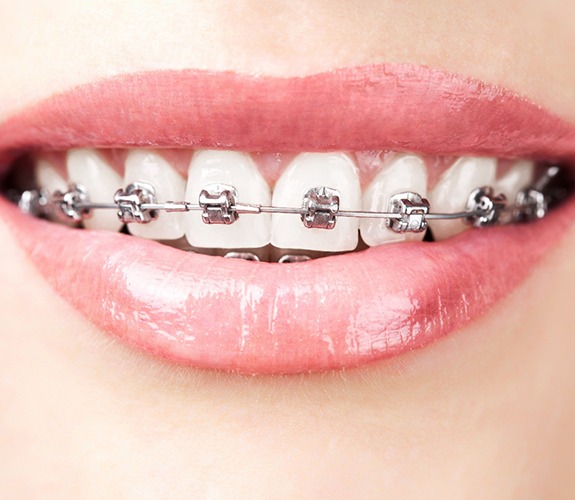
Your teeth are attached to the jaw bone through small fiber-like tissues, which enable the teeth to have some degree of mobility. Metal brackets and wires can be attached to the teeth and apply slight, sustained pressure. Over time, this pressure causes the teeth to move slowly to a better position. About every 4 to 6 weeks, we need to adjust the wiring so that the braces keep exerting the precise and necessary force.
Treatment with traditional braces typically takes between 18 months and three years. The type and complexity of corrections will affect this timeline, and during your consultation with us, we can give you a more specific estimate. Regardless of how long it takes even for complicated cases, our orthodontist is fully prepared to manage your treatment and give you a perfectly aligned smile.
What Orthodontic Issues Can Braces Fix?
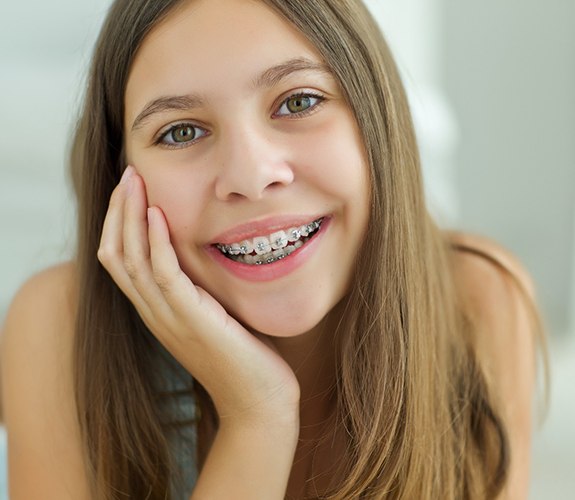
Unlike clear aligners, traditional braces are known for their ability to correct many common orthodontic problems, even severe ones. Here are some examples of situations that may necessitate traditional braces:
Bite Misalignment
In addition to complicating eating, an uneven bite may cause excessive enamel wear for certain teeth and other oral health issues. Whether you have an overbite, underbite, crossbite, or another jaw alignment problem, braces can resolve it.
Crowded & Crooked Teeth
On top of the aesthetic issues that come with crooked and crowded teeth, you may struggle with brushing and flossing as effectively as you should. After straightening your teeth with braces, you should have an easier time maintaining good oral hygiene.
Gapped Teeth
In most cases, patients don’t like too much space being visible between the teeth. Braces can close any unsightly gaps.
Caring for Your Braces

It is especially crucial to keep your teeth free of cavities and gum disease while you have braces because these issues can interfere with the orthodontic process. To help your smile stay in excellent condition, our in-house orthodontist can advise you on how to brush effectively with braces and clean around the wires.
In addition, you should take necessary steps to protect braces from physical damage by avoiding hard, sticky, or crunchy foods that might break the brackets or wires. Also, if you participate in sports, we recommend getting a customized mouthguard to accommodate your braces and absorb a hit to the face.
With straight teeth, you can create a smile lasting a lifetime through braces! Let Grand Dental – Lake Zurich’s orthodontic team lead the way and schedule a consultation today.
Understanding the Cost of Traditional Braces

Traditional braces may look the same for many patients, but they’re different when it comes to their cost. The reason is that there are many factors our team at Grand Dental – Lake Zurich must consider before crafting an estimate that we can review with a patient. Although the price may be a deterrent for some, our team does our best to explain how insurance works and other financial payment options to make treatment more affordable.
Factors That Affect the Cost of Traditional Braces
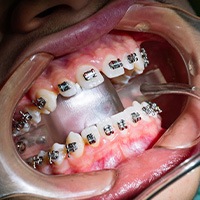
The following factors must be considered by our dentists before we can determine how much an individual can expect to pay for traditional braces:
- The severity of crookedness, overlapping, gaps, or bite misalignment
- Whether preliminary procedures are required to address existing oral health concerns (i.e., gum disease, tooth decay)
- If orthodontic appliances, like rubber bands or a palate expander, are necessary to move teeth along throughout treatment
- Whether one or both arches require treatment
- A patient’s age, as adults may need to spend more time in braces than teens because teeth are readily set within the jawbone
- The number of follow-up appointments required
- How long we can expect it to take for treatment to be completed
Professional Braces vs. “DIY” Braces: Which Costs More?
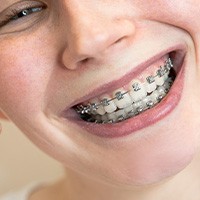
Professional braces may cost more than DIY versions; however, if a person wants their investment to last long and produce the right kind of results, they’ll find these orthodontics are worth the money and time. Yes, DIY solutions are much cheaper, but so is the quality of care.
Not only does a licensed professional ensure the health and safety of one’s smile while undergoing orthodontic treatment, but regular follow-up appointments allow for clear observation, so a person’s smile remains on track.
DIY braces can cause significant damage if they’re not regularly checked. Some teeth may try to shift in the opposite direction, further damaging one’s smile.
Does Dental Insurance Cover Traditional Braces?
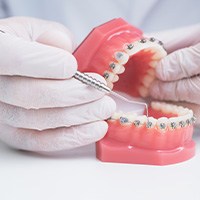
Some dental insurance companies provide orthodontia as a partially covered service; however, this isn’t always the case. Some plans do not include it, so a person is required to purchase a supplemental plan. No matter the situation, our team will always do our best to maximize available patient benefits as well as file all the necessary paperwork to reduce stress and help keep the individual focused on their new smile.
Options for Making Traditional Braces Affordable
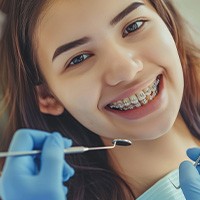
At Grand Dental – Lake Zurich, we are pleased to offer patients alternative solutions that make paying for braces easy and affordable. With CareCredit or Alphaeon Credit, a person can select from one of their many low-and-no-interest flexible financing options so that payments remain low each month, making it possible to stay well within one’s budget.
Another option is applying for our Grand Advantage Plan – a premium solution that offers preventive services for a membership fee. Additionally, we offer a 10% discount on all orthodontic treatments.
Traditional Braces FAQs
How long do traditional braces take?
The average timeframe for traditional braces is 1-3 years; however, the length of time is different for each patient. Our in-house orthodontist will provide a clearer timeline during the consultation phase of treatment.
It’s worth noting that different factors play a role in how long an individual will wear traditional braces, such as:
- Age – Children and teenagers may not have to wear braces as long as adults because their teeth and jawbone are not fully set.
- Severity of Alignment – The more distance teeth need to move, the longer treatment will take.
- Compliance – Patients who follow treatment guidelines closely are more likely to finish sooner. However, if teeth are not moving as quickly as expected, or a person neglects to wear their rubber bands, this can prolong the treatment time.
Can you drink coffee with traditional braces?
Yes, it is possible to drink coffee while wearing traditional braces, but it’s important to remember that teeth and brackets can stain, so limiting one’s consumption is essential. Should teeth become stained throughout treatment, they may appear splotchy once braces are removed.
To avoid any kind of discoloration, it’s best to sip coffee through a straw so that it doesn’t come into direct contact with teeth. Also, patients should make sure to brush and floss after consuming a cup of coffee; however, they should wait 20 minutes to avoid spreading the tannins and bacteria. If this is not possible, rinsing with water can minimize the effects of staining.
Can you whiten your teeth while wearing braces?
Whitening one’s teeth while wearing braces is not a good idea because the whitening solution can cause uneven shading. Its inability to target areas covered by brackets or those teeth that are shifting can be problematic, so instead, dentists and orthodontists recommend that patients wait until after treatment is complete.
While wearing braces, patients can use whitening toothpaste and mouthwash to remove minimal surface stains.
Can I get traditional braces on just my top or bottom teeth?
Having traditional braces placed on just the top or bottom row of teeth might seem like a more convenient and cost-effective option; however, it’s unlikely that a dentist or orthodontist will recommend it. The reason is that braces are made to move both arches so that they align correctly. Only treating one arch can cause more harm than good.
For example, if crowding is the issue, braces will help straighten teeth and move them forward. Braces will also close gapped teeth, resulting in them moving backward. If only one arch is treated, this can make it harder for both rows to come together properly, resulting in a more pronounced bite problem that can cause TMJ, bruxism, or difficulty eating.